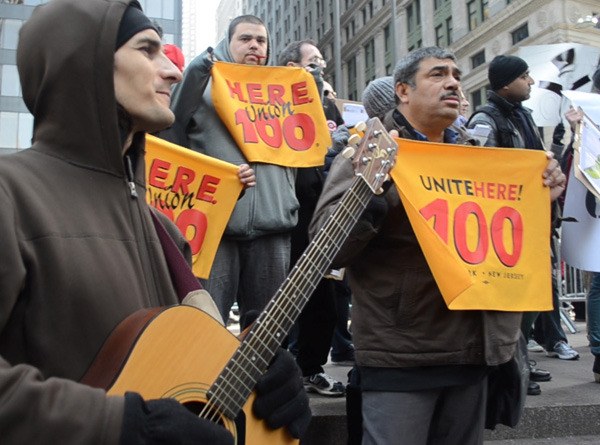Beau Borrero saw the feeding and sheltering of hungry strangers amidst the cold and rain. He stood witness to police pepper spraying and striking faces with clubs, and the twisting and contorting of limbs that he can only describe as torture. Borrero also watched ordinary people from all walks of life with signs held high above their heads, their slogans reverberating throughout the country.
“I was totally blown away by the power and energy of the message of the movement,” Borrero said. “‘We are the 99 percent.’ What could be simpler than that? It’s a modern version of Lincoln’s ‘of the people, by the people, and for the people.’ If the founding fathers could see what the rich and powerful have done to their country, I think they would cry.”
Borrero visited the Occupy Wall Street movement in September and returned to his home in Friday Harbor inspired to write the song “Rise Up.” Within a few weeks of its inception, the song was recorded with local musicians Teddy Deane, Jonathan Piff, Benj Ross, and Borrero’s mom Gretchen Gubelman.
Then he flew back to New York — guitar in hand _ and with the help of Kwame Simms, director and videographer, he created the “Rise Up” music video with Occupy Wall Street as his backdrop.Gubleman said it was thrilling to hear the song and see the music video. It brought up memories of her days as a young woman in New York City fighting for civil rights and in protest against the Vietnam War — she even marched when she was pregnant with Borrero.
The music video features Borreo — looking ironic in a suit with his shoulder length hair waving in the wind — interspersed with humorous and dark images from the movement, which Gubelman calls a “collage of news, historical figures and literature bringing the song lyrics to life.” “Rise up look through the lies and wise up … open your eyes,” sings Borrero as an image of an 84-year-old woman who has just been pepper sprayed is displayed.
He says that “Occupy” may be geographically removed from San Juan, but it has affected everyone by drawing attention to the fact that we all need good schools, healthcare, and less war. If history is any indication then art has the ability to create social change, said Borrero.
“The American Revolution may well not have happened without the book, ‘Common Sense’ by Thomas Paine. ‘Uncle Tom’s Cabin’ by Harriet Beecher Stowe went a long way towards changing opinions about slavery in this country,” he said. “Would we still be in Vietnam if it weren’t for Woodstock and the music of the late 1960’s? Probably not, but I think the music of that time certainly influenced attitudes and ultimately public policy.”
He describes music as coming in through the “back door of our minds, even while the rational, thinking, defensive part of our brain guards the front door against anything new that might rock the boat.”While mainstream musicians continue to sing repetitive lyrics about sex, partying, romance and heartbreak, Borrero sings with eloquent and clever words. He’s not afraid to march along side the protesters while strumming his guitar.Maybe signs, catchy phrases and music will not change the distribution of wealth and power, but Borrero believes it will get people talking. And who knows what could happen next.
“The movement has largely accomplished its goals — income distribution is now an issue when it wasn’t before ‘Occupy,’” Borrero said. “‘Occupy’ has also drawn attention to the fact that the political system in the U.S. is basically broken.”Watch Beau Borrero’s ‘Rise Up’ video at beauborrero.com/videos.




